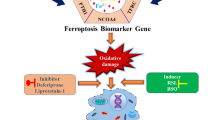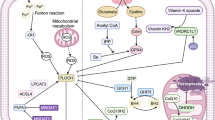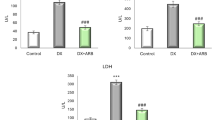Abstract
Quercetin has been documented to possess a multitude of pharmacological effects, encompassing antioxidant, antiviral, antimicrobial, and anti-inflammatory properties. Nevertheless, the exact molecular mechanisms responsible for the anti-tumor properties of quercetin remain to be fully explicated. To this end, quercetin was administered to gastric cancer cells (in vitro) AGS and MKN45, as well as BALB/c mice (in vivo). The proliferation ability of cells was evaluated using cholecystokinin octapeptide (CCK-8) and colony formation assays. The evaluation of ferroptosis involved the measurement of iron, malondialdehyde (MDA), and lipid reactive oxygen species. Autophagy and apoptosis were evaluated using immunofluorescence staining, western blotting, and flow cytometry analysis. Our findings indicate that quercetin significantly inhibited cell viability and tumor volume compared to the control group. Additionally, quercetin was found to decrease glutathione (GSH), malondialdehyde, and reactive oxygen species (ROS) levels while suppressing beclin1 and LC3B levels in cancer cells. Remarkably, the utilization of siATG5 was found to reverse all the aforementioned effects of quercetin. Ultimately, the effects of quercetin on gastric cancer were validated. In summary, our findings provide evidence that quercetin facilitates autophagy-mediated ferroptosis in gastric cancer.








Similar content being viewed by others
References
Alizadeh SR, Ebrahimzadeh MA (2022) Quercetin derivatives: drug design, development, and biological activities, a review. Eur J Med Chem 229:114068. https://doi.org/10.1016/j.ejmech.2021.114068
Amieva M, Peek RM Jr (2016) Pathobiology of Helicobacter pylori-Induced Gastric Cancer. Gastroenterology 150:64–78. https://doi.org/10.1053/j.gastro.2015.09.004
Calgarotto AK, Maso V, Junior GCF, Nowill AE, Filho PL, Vassallo J, Saad STO (2018) Antitumor activities of Quercetin and Green Tea in xenografts of human leukemia HL60 cells. Sci Rep 8:3459. https://doi.org/10.1038/s41598-018-21516-5
Cao QH, Liu F, Yang ZL, Fu XH, Yang ZH, Liu Q, Wang L, Wan XB, Fan XJ (2016) Prognostic value of autophagy related proteins ULK1, Beclin 1, ATG3, ATG5, ATG7, ATG9, ATG10, ATG12, LC3B and p62/SQSTM1 in gastric cancer. Am J Transl Res 8:3831–3847
Chen X, Kang R, Kroemer G, Tang D (2021b) Broadening horizons: the role of ferroptosis in cancer. Nat Reviews Clin Oncol 18:280–296. https://doi.org/10.1038/s41571-020-00462-0
Chen C, Wang D, Yu Y, Zhao T, Min N, Wu Y, Kang L, Zhao Y, Du L, Zhang M et al (2021a) Legumain promotes tubular ferroptosis by facilitating chaperone-mediated autophagy of GPX4 in AKI. Cell Death Dis 12:65. https://doi.org/10.1038/s41419-020-03362-4
Chen X, Li J, Kang R, Klionsky DJ, Tang D (2021c) Ferroptosis: machinery and regulation. Autophagy 17:2054–2081. https://doi.org/10.1080/15548627.2020.1810918
Chen Z, Ouyang C, Zhang H, Gu Y, Deng Y, Du C, Cui C, Li S, Wang W, Kong W et al (2022) Vascular smooth muscle cell-derived hydrogen sulfide promotes atherosclerotic plaque stability via TFEB (transcription factor EB)-mediated autophagy. Autophagy 18:2270–2287. https://doi.org/10.1080/15548627.2022.2026097
Chuang KC, Chang CR, Chang SH, Huang SW, Chuang SM, Li ZY, Wang ST, Kao JK, Chen YJ, Shieh JJ (2020) Imiquimod-induced ROS production disrupts the balance of mitochondrial dynamics and increases mitophagy in skin cancer cells. J Dermatol Sci 98:152–162. https://doi.org/10.1016/j.jdermsci.2020.03.009
Devis-Jauregui L, Eritja N, Davis ML, Matias-Guiu X, Llobet-Navàs D (2021) Autophagy in the physiological endometrium and cancer. Autophagy 17:1077–1095. https://doi.org/10.1080/15548627.2020.1752548
Di Petrillo A, Orrù G, Fais A, Fantini MC (2022) Quercetin and its derivates as antiviral potentials: a comprehensive review. Phytother Res 36:266–278. https://doi.org/10.1002/ptr.7309
Doll S, Proneth B, Tyurina YY, Panzilius E, Kobayashi S, Ingold I, Irmler M, Beckers J, Aichler M, Walch A et al (2017) ACSL4 dictates ferroptosis sensitivity by shaping cellular lipid composition. Nat Chem Biol 13:91–98. https://doi.org/10.1038/nchembio.2239
Gao W, Wang X, Zhou Y, Wang X, Yu Y (2022) Autophagy, ferroptosis, pyroptosis, and necroptosis in tumor immunotherapy. Signal Transduct Target Ther 7:196. https://doi.org/10.1038/s41392-022-01046-3
Gao W, Wang Y, Wang R, Wang YH, Xu JW, He XJ (2022b) Antiproliferative piperidine alkaloids from giant taro (Alocasia macrorrhiza). Chin J Nat Med 20:541–550. https://doi.org/10.1016/s1875-5364(22)60165-1
Guerrini GP, Esposito G, Magistri P, Serra V, Guidetti C, Olivieri T, Catellani B, Assirati G, Ballarin R, Di Sandro S et al (2020) Robotic versus laparoscopic gastrectomy for gastric cancer: the largest meta-analysis. Int J Surg (London England) 82:210–228. https://doi.org/10.1016/j.ijsu.2020.07.053
Han D, Jiang L, Gu X, Huang S, Pang J, Wu Y, Yin J, Wang J (2020) SIRT3 deficiency is resistant to autophagy-dependent ferroptosis by inhibiting the AMPK/mTOR pathway and promoting GPX4 levels. J Cell Physiol 235:8839–8851. https://doi.org/10.1002/jcp.29727
He L, Zhang N, Wang L, Du L, Li C, Li Y, Li X, Zhu X, Lu Q, Yin X (2021) Quercetin inhibits AQP1 translocation in high-glucose-cultured SRA01/04 cells through PI3K/Akt/mTOR pathway. Curr Mol Pharmacol 14:587–596. https://doi.org/10.2174/1874467213666200908120501
Hosseini A, Razavi BM, Banach M, Hosseinzadeh H (2021) Quercetin and metabolic syndrome: a review. Phytother Res 35:5352–5364. https://doi.org/10.1002/ptr.7144
Jiang X, Stockwell BR, Conrad M (2021) Ferroptosis: mechanisms, biology and role in disease. Nat Rev Mol Cell Biol 22:266–282. https://doi.org/10.1038/s41580-020-00324-8
Karimi P, Islami F, Anandasabapathy S, Freedman ND, Kamangar F (2014) Gastric cancer: descriptive epidemiology, risk factors, screening, and prevention. Cancer epidemiology, biomarkers & prevention: a publication of the American Association for Cancer Research. Cosponsored Am Soc Prev Oncol 23:700–713. https://doi.org/10.1158/1055-9965.epi-13-1057
Kim TW, Lee HG (2021) Apigenin induces autophagy and cell death by targeting EZH2 under Hypoxia conditions in Gastric Cancer cells. Int J Mol Sci 22. https://doi.org/10.3390/ijms222413455
Kuwada K, Kuroda S, Kikuchi S, Yoshida R, Nishizaki M, Kagawa S, Fujiwara T (2019) Clinical impact of Sarcopenia on gastric Cancer. Anticancer Res 39:2241–2249. https://doi.org/10.21873/anticanres.13340
Lee YC, Chiang TH, Chou CK, Tu YK, Liao WC, Wu MS, Graham DY (2016) Association between Helicobacter pylori Eradication and Gastric Cancer incidence: a systematic review and Meta-analysis. Gastroenterology 150:1113–1124e1115. https://doi.org/10.1053/j.gastro.2016.01.028
Lei G, Zhang Y, Koppula P, Liu X, Zhang J, Lin SH, Ajani JA, Xiao Q, Liao Z, Wang H et al (2020) The role of ferroptosis in ionizing radiation-induced cell death and tumor suppression. Cell Res 30:146–162. https://doi.org/10.1038/s41422-019-0263-3
Lei G, Zhuang L, Gan B (2022) Targeting ferroptosis as a vulnerability in cancer. Nat Rev Cancer 22:381–396. https://doi.org/10.1038/s41568-022-00459-0
Liu J, Kuang F, Kroemer G, Klionsky DJ, Kang R, Tang D (2020a) Autophagy-dependent ferroptosis: Machinery and Regulation. Cell Chem Biology 27:420–435. https://doi.org/10.1016/j.chembiol.2020.02.005
Liu JZ, Hu YL, Feng Y, Jiang Y, Guo YB, Liu YF, Chen X, Yang JL, Chen YY, Mao QS et al (2020b) BDH2 triggers ROS-induced cell death and autophagy by promoting Nrf2 ubiquitination in gastric cancer. J Exp Clin Cancer Res 39:123. https://doi.org/10.1186/s13046-020-01620-z
Liu X, Chen C, Han D, Zhou W, Cui Y, Tang X, Xiao C, Wang Y, Gao Y (2022) SLC7A11/GPX4 inactivation-mediated ferroptosis contributes to the pathogenesis of Triptolide-Induced Cardiotoxicity. Oxid Med Cell Longev 2022:3192607. https://doi.org/10.1155/2022/3192607
Mathew B, Chennakesavalu M, Sharma M, Torres LA, Stelman CR, Tran S, Patel R, Burg N, Salkovski M, Kadzielawa K et al (2021) Autophagy and post-ischemic conditioning in retinal ischemia. Autophagy 17:1479–1499. https://doi.org/10.1080/15548627.2020.1767371
Mi Y, Zhong L, Lu S, Hu P, Pan Y, Ma X, Yan B, Wei Z, Yang G (2022) Quercetin promotes cutaneous wound healing in mice through Wnt/β-catenin signaling pathway. J Ethnopharmacol 290:115066. https://doi.org/10.1016/j.jep.2022.115066
Mou Y, Wang J, Wu J, He D, Zhang C, Duan C, Li B (2019) Ferroptosis, a new form of cell death: opportunities and challenges in cancer. J Hematol Oncol 12:34. https://doi.org/10.1186/s13045-019-0720-y
Nishida Y, Arakawa S, Fujitani K, Yamaguchi H, Mizuta T, Kanaseki T, Komatsu M, Otsu K, Tsujimoto Y, Shimizu S (2009) Discovery of Atg5/Atg7-independent alternative macroautophagy. Nature 461:654–658. https://doi.org/10.1038/nature08455
Niu B, Liao K, Zhou Y, Wen T, Quan G, Pan X, Wu C (2021) Application of glutathione depletion in cancer therapy: enhanced ROS-based therapy, ferroptosis, and chemotherapy. Biomaterials 277:121110. https://doi.org/10.1016/j.biomaterials.2021.121110
Pontel LB, Bueno-Costa A, Morellato AE, Carvalho Santos J, Roué G, Esteller M (2022) Acute lymphoblastic leukemia necessitates GSH-dependent ferroptosis defenses to overcome FSP1-epigenetic silencing. Redox Biol 55:102408. https://doi.org/10.1016/j.redox.2022.102408
Qin X, Zhang J, Wang B, Xu G, Yang X, Zou Z, Yu C (2021) Ferritinophagy is involved in the zinc oxide nanoparticles-induced ferroptosis of vascular endothelial cells. Autophagy 17:4266–4285. https://doi.org/10.1080/15548627.2021.1911016
Rezabakhsh A, Rahbarghazi R, Malekinejad H, Fathi F, Montaseri A, Garjani A (2019) Quercetin alleviates high glucose-induced damage on human umbilical vein endothelial cells by promoting autophagy. Phytomedicine 56:183–193. https://doi.org/10.1016/j.phymed.2018.11.008
Sathianarayanan S, Ammanath AV, Biswas R, Sukumaran BA, Venkidasamy S B (2022) A new approach against Helicobacter pylori using plants and its constituents: a review study. Microb Pathog 168:105594. https://doi.org/10.1016/j.micpath.2022.105594
Singh P, Arif Y, Bajguz A, Hayat S (2021) The role of quercetin in plants. Plant Physiol Biochemistry: PPB 166:10–19. https://doi.org/10.1016/j.plaphy.2021.05.023
Smyth EC, Nilsson M, Grabsch HI, van Grieken NC, Lordick F (2020) Gastric cancer. Lancet 396:635–648. https://doi.org/10.1016/s0140-6736(20)31288-5
Sun Y, Chen P, Zhai B, Zhang M, Xiang Y, Fang J, Xu S, Gao Y, Chen X, Sui X et al (2020) The emerging role of ferroptosis in inflammation. Biomed Pharmacother 127:110108. https://doi.org/10.1016/j.biopha.2020.110108
Tan A, Prasad R, Lee C, Jho EH (2022) Past, present, and future perspectives of transcription factor EB (TFEB): mechanisms of regulation and association with disease. Cell Death Differ 29:1433–1449. https://doi.org/10.1038/s41418-022-01028-6
Wan B, Zhu J, Chang Q, Zhou H, Shi Z, Min L, Cai Y, Guan H (2018) Alpha, 2’-dihydroxy-4,4’-dimethoxydihydrochalcone inhibits cell proliferation, invasion, and migration in gastric cancer in part via autophagy. Biomed Pharmacother 98:709–718. https://doi.org/10.1016/j.biopha.2017.12.081
Wang YC (2014) Medicinal plant activity on Helicobacter pylori related diseases. World J Gastroenterol 20:10368–10382. https://doi.org/10.3748/wjg.v20.i30.10368
Wang Y, Wei Z, Pan K, Li J, Chen Q (2020) The function and mechanism of ferroptosis in cancer. Apoptosis 25:786–798. https://doi.org/10.1007/s10495-020-01638-w
Wang Y, Song Y, Zhou L, Wang M, Wang D, Bai J, Fu S, Yu J (2022) The overexpression of TOB1 induces Autophagy in Gastric Cancer cells by secreting Exosomes. Dis Markers 2022:7925097. https://doi.org/10.1155/2022/7925097
Wei B, Huang Q, Huang S, Mai W, Zhong X (2016) Trichosanthin-induced autophagy in gastric cancer cell MKN-45 is dependent on reactive oxygen species (ROS) and NF-κB/p53 pathway. J Pharmacol Sci 131:77–83. https://doi.org/10.1016/j.jphs.2016.03.001
Wei R, Zhao Y, Wang J, Yang X, Li S, Wang Y, Yang X, Fei J, Hao X, Zhao Y et al (2021) Tagitinin C induces ferroptosis through PERK-Nrf2-HO-1 signaling pathway in colorectal cancer cells. Int J Biol Sci 17:2703–2717. https://doi.org/10.7150/ijbs.59404
Yi H, Yan X, Luo Q, Yuan L, Li B, Pan W, Zhang L, Chen H, Wang J, Zhang Y et al (2018) A novel small molecule inhibitor of MDM2-p53 (APG-115) enhances radiosensitivity of gastric adenocarcinoma. J Exp Clin Cancer Res 37:97. https://doi.org/10.1186/s13046-018-0765-8
Zhang YQ, Pei JH, Shi SS, Guo XS, Cui GY, Li YF, Zhang HP, Hu WQ (2019) CRISPR/Cas9-mediated knockout of the PDEF gene inhibits migration and invasion of human gastric cancer AGS cells. Biomed Pharmacother 111:76–85. https://doi.org/10.1016/j.biopha.2018.12.048
Zhang Q, Wang X, Cao S, Sun Y, He X, Jiang B, Yu Y, Duan J, Qiu F, Kang N (2020) Berberine represses human gastric cancer cell growth in vitro and in vivo by inducing cytostatic autophagy via inhibition of MAPK/mTOR/p70S6K and akt signaling pathways. Biomed Pharmacother 128:110245. https://doi.org/10.1016/j.biopha.2020.110245
Zhang S, Liang W, Abulizi Y, Xu T, Cao R, Xun C, Zhang J, Sheng W (2021a) Quercetin alleviates intervertebral disc degeneration by modulating p38 MAPK-Mediated autophagy. Biomed Res Int 2021:6631562. https://doi.org/10.1155/2021/6631562
Zhang Y, Swanda RV, Nie L, Liu X, Wang C, Lee H, Lei G, Mao C, Koppula P, Cheng W et al (2021b) mTORC1 couples cyst(e)ine availability with GPX4 protein synthesis and ferroptosis regulation. Nat Commun 12:1589. https://doi.org/10.1038/s41467-021-21841-w
Zhou B, Liu J, Kang R, Klionsky DJ, Kroemer G, Tang D (2020) Ferroptosis is a type of autophagy-dependent cell death. Semin Cancer Biol 66:89–100. https://doi.org/10.1016/j.semcancer.2019.03.002
Funding
National Natural Science Foundation of China (81870453); Transverse Connection Research project of Shandong university (1520020012).
Author information
Authors and Affiliations
Contributions
All authors participated in the design, interpretation of the studies and analysis of the data and review of the manuscript; JH, JNL and JC conducted the experiments, JNL and JC wrote and revised the manuscript.
Corresponding authors
Ethics declarations
Competing interests
The authors declared no potential conflicts of interest with respect to the research, authorship, and/or publication of this article.
Ethical approval
All animal protocols were approved by the Animal Care and Use Committee of the Affiliated Yantai Yuhuangding Hospital of Qingdao University (2023 − 419).
Additional information
Publisher’s Note
Springer Nature remains neutral with regard to jurisdictional claims in published maps and institutional affiliations.
Rights and permissions
Springer Nature or its licensor (e.g. a society or other partner) holds exclusive rights to this article under a publishing agreement with the author(s) or other rightsholder(s); author self-archiving of the accepted manuscript version of this article is solely governed by the terms of such publishing agreement and applicable law.
About this article
Cite this article
Huang, J., Chen, J. & Li, J. Quercetin promotes ATG5-mediating autophagy-dependent ferroptosis in gastric cancer. J Mol Histol 55, 211–225 (2024). https://doi.org/10.1007/s10735-024-10186-5
Received:
Accepted:
Published:
Issue Date:
DOI: https://doi.org/10.1007/s10735-024-10186-5




